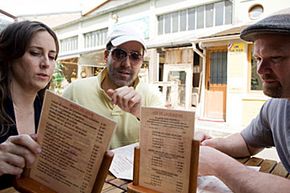To become a frugal traveler, there's one pivotal question you need to ask yourself. "What level of discomfort are you willing to experience?" asks Seth Kugel, author of the New York Times's Frugal Traveler blog. It's not just an inquiry into how likely you are to sacrifice plush hotels for hostel beds. It's a question of how much mental discomfort you can handle. It's about your willingness to use public transportation instead of hailing a cab, eating from street vendors instead of at four-star eateries, and haggling for the lowest price. The more discomfort you can handle, the less you need to spend. Let's take a look at a few surprisingly comfortable ways to save on your next trip.
Transportation is always going to be comparatively pricey, but there are still simple ways to find savings on this unavoidable travel expense. Sites like Kayak.com, Expedia.com, Orbitz.com and other travel agency Web sites are good jumping off points for determining a trip itinerary, but you can often negotiate lower rates by contacting the services and booking individually. Booking flights and hotels directly can also eliminate transaction fees, which can be as much as $12 [source: Consumer Reports].
Advertisement
For international flights, do a Web search to find your destination country's budget air carriers, which typically offer lower rates than national airlines, but often go unlisted on American travel agency Web sites. Sign up for a service like Airfarewatchdog.com, which sends e-mail alerts for deals on specific flight itineraries, which can help you find the lowest fares to your desired destination. If you're flexible on the dates and destinations of your trip, airline carriers offer discounted flights and special packages to their e-mail list subscribers. If you need to rent a car, use a service like Autoslash.com, a site that tracks discounts for automobile rentals and automatically rebooks your reservation if the price drops.
Upon arrival, use a nontraditional lodging option to cut expenses. Couchsurfing.org is a networking service that started in 2004 to connect travelers with residents in destinations around the world, who accommodate them in their homes at no charge. Hostelworld.com lists the availability in hostels as well as private apartment rentals, bed and breakfast vacancies, campsites, and other options. You could also consider a home exchange, in which you trade stays in homes with another person.
Let's talk about a few ways to find the perfect budget travel destination.
Advertisement


